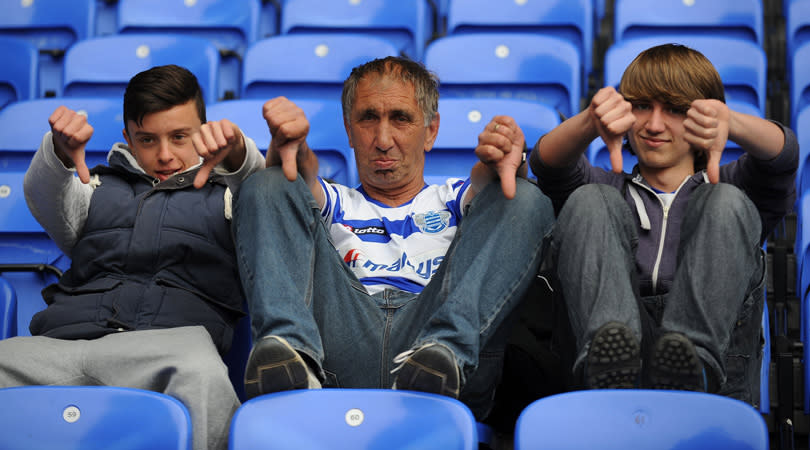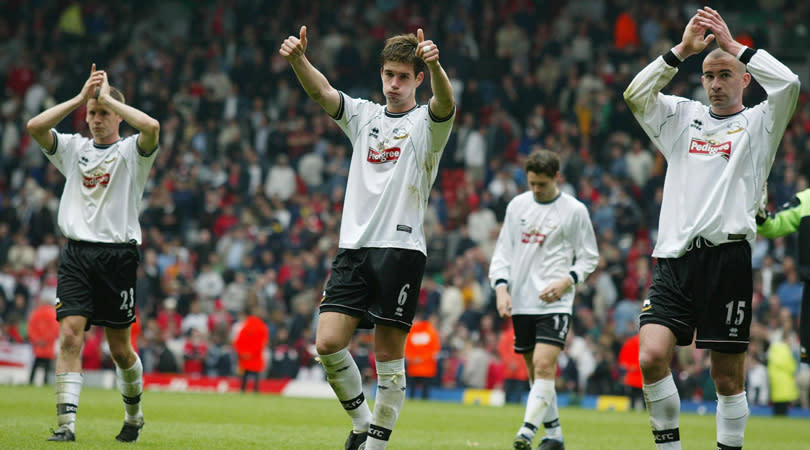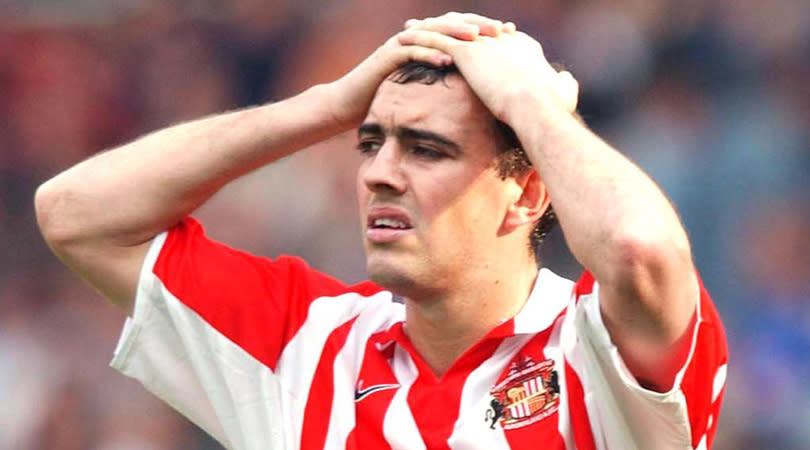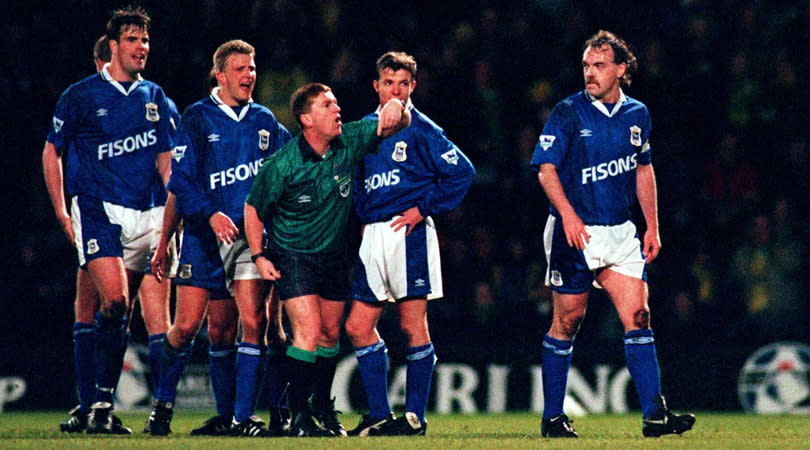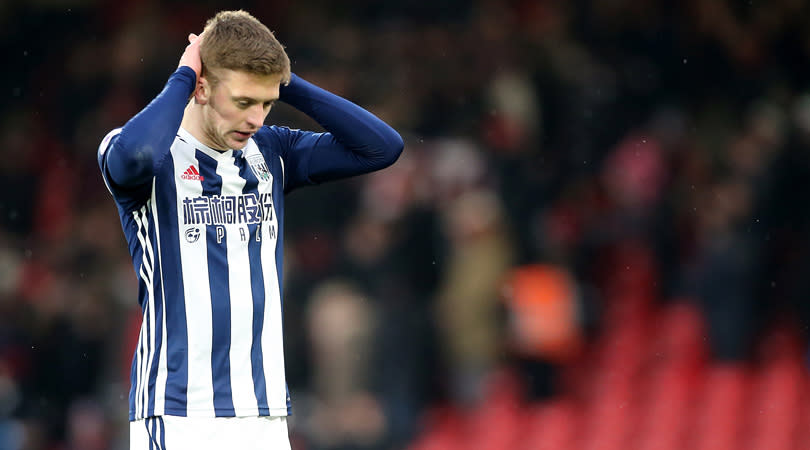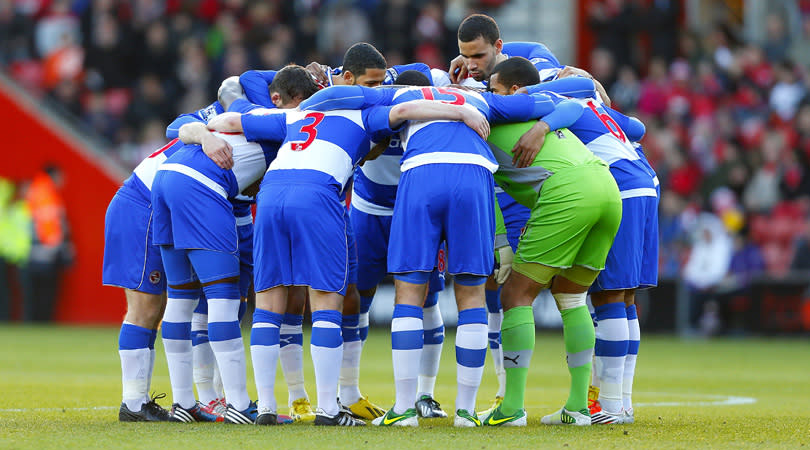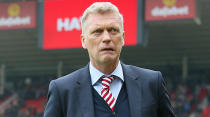Ranked! The 20 worst Premier League teams ever – by points total
Over the years, the Premier League has brought some joyous moments of pure skill and drama, featuring stunning goals and last-minute reversals. It has also served up some absolute dross – and that’s what we’re celebrating here.
FourFourTwo have scoured the tables to bring you the 20 teams who’ve racked up the fewest points in a Premier League season (and even got the calculator out to adjust for the 42-game seasons of the early 1990s). Sunderland fans, look away now.
20. Bolton (1995/96)
Points: 29, Goal difference: -32

The Trotters trotted into their first Premier League season under new management. After steering them to the top flight via the play-offs, Bruce Rioch departed for Arsenal, with Roy McFarland joining as co-manager (a very ’90s role) alongside Rioch’s assistant Colin Todd.
READ MORE: The top 20 deadliest Premier League players - ranked by shots to goals
READ MORE: Phil Jones and the 13 funniest Panini 2018 World Cup stickers
READ MORE: Gossip - Bale and Hazard set for sensational swap deal
The joint venture was a joint disaster. McFarland was sacked on New Years’ Day with Bolton glued to the bottom of the table. There was a brief revival under Todd’s sole stewardship, but Wanderers slid down into Division One on the penultimate day of the season. John McGinlay was their top scorer with nine, which says a lot.
19. Middlesbrough (2016/17)
Points: 28, Goal difference: -26

FourFourTwo went up to Middlesbrough’s training ground during this season for a couple of interviews, and Aitor Karanka was wandering around with no shoes on. A little insight into the glamorous football journalism life, there. The Spaniard had steered the club to the top flight with some exciting attacking football, but the goals dried up in the top flight despite the acquisition of Alvaro Negredo. Boro scored just 27 in the league all season.
After a strong start, there was an inexorable slide, and Karanka was given the boot in March to be replaced by Steve Agnew. Unfortunately it was all too late.
18. Reading (2012/13)
Points: 28 points, Goal difference: -28

It took the Royals until November to win their first league game of the season, a 2-1 triumph over Everton at the 11th attempt. A brief surge in form in January, including wins over Newcastle and West Brom, led to striker Adam le Fondre and manager Brian McDermott winning Player and Manager of the month respectively, but it was short-lived.
McDermott was sacked a month later and replaced by Nigel Adkins, who was unable to steady the ship. The Royals ended the season with six wins from 38 games, but still didn’t finish bottom (see QPR).
17. Watford (2006/07)
Points: 28, Goal difference: -30

Promoted clubs tended to struggle in this era, and Aidy Boothroyd’s Watford fit the bill perfectly, despite having brought in a number of experienced players including Chris Powell, and Danny Shittu, plus goalkeeper Ben Foster on loan from Manchester United.
It took until November for their first win, over Middlesbrough, and they didn’t get another until January 23 – the same day then-top-scorer Ashley Young departed for Aston Villa. Algerian Hameur Bouazza stepped up his game, but it wasn’t enough. The low point came when Spurs keeper Paul Robinson accidentally scored from a free-kick that bounced over Foster’s head.
16. Leicester (2001/02)
Points: 28, Goal difference: -34

A 5-0 defeat to newly promoted Bolton on the opening day set the tone for a dismal final season at Filbert Street. Peter Taylor lasted until the end of September before being replaced by Dave Bassett.
The new boss picked up a couple of wins before enduring a four-month winless run that sealed the Foxes' doom. They secured just five victories all season, despite the efforts of top league scorer Brian Deane (six goals) and player of the year Robbie Savage.
15. Swindon (1993/94)
Points: 30 (27.14 adjusted for a 38-game season), Goal difference: -53

The Robins' first and last top-flight season started with four defeats in a row, and continued with a winless run that stretched until November – their 16th league game. Swindon had been denied promotion three years previously due to financial irregularities, but came up via the play-off final thanks to player-manager Glenn Hoddle.
He’d departed for Chelsea, though, with assistant John Gorman left behind. There were some memorable moments, including a thrilling draw with Liverpool and win over Spurs, but Swindon haemorrhaged goals. They were the first side in 30 years to ship more than a hundred, which meant that the efforts of top scorer Jan Age Fjortoft (12 league goals) were in vain. Two points from their last eight games sealed Swindon’s fate, and they finished 10 points adrift of 21st-place Oldham.
14. Portsmouth (2009/10)
Points: 19 (27 with a nine-point deduction), Goal difference: -32

It’s tempting to point at their FA Cup win the previous year, and the nine-point deduction for financial irregularities, then make the argument that maybe this Portsmouth team were actually alright. They weren’t. They were in the relegation zone from week two, and even if you ignore the nine points which were removed in March, they'd still make our list.
The squad is like a Harry Redknapp greatest hits album – but of course the wheeler-dealer was long gone by this point, leaving first Paul Hart, and then Avram Grant to try to shake the likes of Aruna Dindane and Jamie O’Hara into some sort of team.
13. Leicester (1994/95)
Points: 29 (26.2 adjusted for a 38-game season), Goal difference: -35

The Foxes made it back to the top flight via the play-offs at the third attempt, after two final defeats, but their spell in the Premier League was short-lived.
A bad start with just two wins in their first 10 games proved impossible to reverse, and they lost manager Brian Little to Aston Villa in November. His replacement Mark McGhee fared little better and Leicester finished second bottom – two points ahead of Ipswich.
12. West Brom (2002/03)
Points: 26, Goal difference: -36

For the Baggies, promotion to the top flight under Gary Megson heralded an era of bouncing up and down between the top two divisions. He strengthened the squad in the summer with the signings of Jason Koumas and Lee Hughes from Tranmere and Coventry respectively, but this was a squad lacking in Premier League experience, and it showed.
Jason Roberts partnered Danny Dichio up front, with the latter ending up as top scorer with eight goals in all competitions. They still finished seven points ahead of Sunderland.
11. Bradford (2000/01)
Points: 26, Goal difference: -40

Chris Hutchings had a stellar start to his managerial career, but things quickly unravelled. Bradford had narrowly survived the previous season under Paul Jewell, who departed for Sheffield Wednesday in the summer. Hutchings' first assignment was the Intertoto Cup, which Bradford somehow qualified for despite finishing 17th.
He guided them to the semi-finals via trips to Lithuania and the Netherlands, and then continued that good form by beating Chelsea in the first home game of the Premier League season. Unfortunately this was his only league win out of 12, and he was replaced in November by Jim Jefferies, who fared little better as strikers Dean Windass and Benito Carbone struggled for goals.
10. QPR (2012/13)
Points: 25, Goal difference: -30

After surviving relegation by a point the previous year, despite Joey Barton’s antics against Manchester City and that Sergio Aguero moment, QPR boosted their squad in the summer under Mark Hughes. Junior Hoilett, Jose Bosingwa, Julio Cesar, Ryan Nelsen, Andy Johnson and Rob Green arrived on free transfers, joined by Samba Diakite, Park Ji-sung, Stephane Mbia and Real Madrid's Esteban Granero.
After Hughes was sacked on November 23 having failed to win a game, Harry Redknapp got the chequebook out again in January. He burned through the cash, splashing £12.5m on Christopher Samba, £8m on Loic Remy, £2m on Jermaine Jenas plus Tal Ben Haim (inevitably) on a free.
Redknapp was more successful than Hughes, and even threatened to build some momentum with back-to-back wins in March. But it was too little too late. A 0-0 draw with an equally dismal Reading at the end of April condemned both sides to the drop.
9. Wolves (2011/12)
Points: 25, Goal difference: -42

Mick McCarthy’s side had finished the previous season just one point above the relegation zone, and sought to strengthen in the summer by bringing in Jamie O’Hara from Spurs and Roger Johnson from Birmingham, who was given the captain’s armband. The season started well – Wolves were even top for a few hours after winning their opening two games – but then went on a run of six defeats in seven.
McCarthy was sacked following a 5-1 loss to West Brom, with caretaker boss Terry Connor appointed to replace him. He failed to win a single game during his tenure, and captain Johnson was fined by the club for arriving at training drunk.
8. West Brom (2017/18)
Points: 24.5 (projected), Goal difference: -25

OK, so this season is still going on, but West Brom look pretty certain to join this list. They have all the hallmarks of the worst sides in Premier League history – poor results, misfiring forwards and veteran players misbehaving.
The Baggies are currently on 21 points with seven games remaining, and have won just once since August despite sacking Tony Pulis and replacing him with Alan Pardew.
7. Ipswich (1994/95)
Points: 27 (24.4 adjusted for 38-game season), Goal difference: -57

The Tractor Boys seemed to have turned their season around in September with a stunning 3-2 win over Manchester United that would arguably cost the Red Devils the Premier League title. But that high point proved fleeting, as they soon slumped back into the relegation zone.
Manager John Lyall was replaced by caretaker Paul Goddard, and then former player George Burley. United returned for revenge in March, racking up a record 9-0 win to effectively end Ipswich’s slender survival hopes.
6. Sunderland (2016/17)
Points: 24, Goal difference: -40

Sam Allardyce had left to take the England job, so David Moyes came in to replace him in the summer after yet another great escape for the Black Cats. Moyes’s feats made Allardyce’s England tenure seem quick and painless by comparison. The Scot seemed to think that the best way to keep Sunderland up in 2017 was with Everton’s squad from 2009.
In came Steven Pienaar, Victor Anichebe, Joleon Lescott, Darron Gibson and Bryan Oviedo, along with freewheeling detective duo Paddy McNair and Donald Love from Manchester United. For some reason it didn’t work – it took until November for a first win, against Bournemouth (who have a knack for losing to the absolute worst team in the league each year). Moyes cut an increasingly dejected figure and the Black Cats were relegated at the end of April, despite Jermain Defoe’s 15-goal heroics.
5. Watford (1999/2000)
Points: 24, Goal difference: -42

Graham Taylor had guided Watford to successive promotions in his second spell at the club, but the Premier League proved a stretch too far on this occasion. Heidar Helguson arrived from Lillestrom, along with midfielder Nordin Wooter from Zaragoza, but they scored just 10 goals between them all season.
The Hornets had a tight defence and made a bright start with back-to-back wins against Liverpool and Bradford in August, plus another surprise victory over Chelsea in September. From there, though, they won just three more games all season and were relegated with what was then the Premier League’s lowest ever points total.
4. Sunderland (2002/03)
Points: 19, Goal difference: -44

Now we come to the really bad stuff. Although this, incredibly, is still not Sunderland’s worst Premier League season. This one started with Peter Reid, continued with Howard Wilkinson, and ended with Mick McCarthy – the dream team of perennially relegated managers.
Sunderland scored just 21 league goals all season – Kevin Phillips grabbed six – and won only four times. After a 2-1 win over Liverpool on December 15, 2002, they didn’t win again until August 23 – by which point they were a second-tier side. That spell included a run of 15 league defeats in a row – a Premier League record. But more on that in a minute.
3. Aston Villa (2015/16)
Points: 17, Goal difference: -49

Tim Sherwood had orchestrated a fist-clenching, gilet-hurling great escape at Villa Park the previous season, and the world was eagerly waiting to see what he could achieve in his first full campaign as a manager. He lasted until October. Villa never really recovered from losing Christian Benteke and Fabian Delph in the summer transfer window, despite the efforts of Rudy Gestede and Jack Grealish.
The Villans did start the season with a win (over Bournemouth, obviously) before six straight defeats spelled the end for Sherwood. Remi Garde fared little better – he managed two wins, including one over Norwich which gave way to an 11-game losing streak.
2. Sunderland (2005/06)
Points: 15, Goal difference: -43

Remember Sunderland’s record-breaking 15-game losing streak from 2002/03? Well, upon their return to the Premier League they managed to extend it even further by losing their first five games of the season.
Mick McCarthy had been trusted to herd the Black Cats back into the top flight, which he managed at the second try, but his attempt at survival didn’t go to plan. He’d brought in a number of players in the summer, including Jon Stead, Kelvin Davis and Anthony Le Tallec (on loan from Liverpool), but that dismal start left Sunderland in the relegation zone. They only managed to escape once for the rest of the season, and finished 15 points behind 19th-placed West Brom having won just three games all season.
1. Derby (2007/08)
Points: 11, Goal difference: -69

It was a case of too much success too soon for Billy Davies and Derby County. The Scot took over in June 2006 saying he could build a promotion-challenging side within three years. The following summer, he found himself scrambling to prepare the Rams for the Premier League with 10 new arrivals, and nine more in January.
Derby drew with Portsmouth in the opening game, but then lost four in a row, conceding 13 and scoring one. A 1-0 win over Newcastle was sandwiched between a 6-0 loss to Liverpool and 5-0 defeat against Arsenal. It was Derby’s only win of the season. Davies was replaced by Paul Jewell, but he couldn’t prevent the Rams setting an unenviable record.
NOW READ Remembering Derby's 2007/08: told by the men who were there

 Yahoo Sport
Yahoo Sport 






































